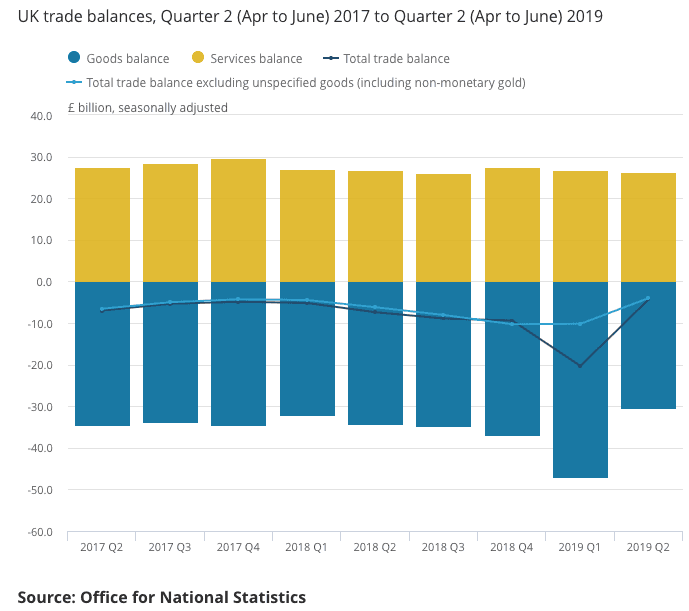Surprise Fall in the Trade Deficit Could be a One-Off
The total trade deficit - the difference between the export and import in goods and services - narrowed £16.0 billion to £4.3 billion in the second quarter of 2019 due largely to falling imports of goods, reports the ONS.
The total trade deficit narrowed £17.2 billion to £4.4 billion in the second quarter 2019.

The slump in demand for imports coincides with a fall of around 8% in the value of Sterling against the Euro since May 2019, however it is arguable that this decline has had any impact on the trade data yet.
"June’s surprise trade surplus largely reflects a £3.0B surplus in trade in erratic goods, not evidence that the weaker Pound is starting to support the economy. Exports of non-monetary gold appear to have surged in June; London is the global centre for gold bullion trade," says Samuel Tombs, UK Economist with Pantheon Macroeconomics.

We might however expect the impact of a weakening Sterling to become more of an issue in coming months as the pass-through effect of the declines becomes evident.
Sterling's trade-weighted index - a measure of Sterling value against a basket of the currencies of the UK's main trading partners - has fallen about 5% since May. It would therefore stand that the cost of imports will rise, and a substitution out of these imports by UK consumers might be expected.
However, Tombs is sceptical:
"We see no reason why the 5% depreciation of trade-weighted Sterling over the last three months will support GDP growth soon, given that net trade failed to make any positive contribution to GDP growth after Sterling’s much bigger 15% depreciation in 2016.
"U.K. exporters will bank the windfall, rather than lower their foreign-currency prices. What’s more, the recent depreciation entirely reflects rising concern about a no-deal Brexit, which will dissuade overseas firms from sourcing goods from U.K. suppliers, given the risk that supply chains could suddenly fail."
Despite the fall in the trade deficit, the UK saw its total trade deficit widen £19.9 billion to £42.8 billion in the 12 months to June 2019, due mainly to the trade in goods deficit, which widened £14.4 billion to £149.2 billion; the services surplus narrowed by a lesser £5.5 billion to £106.4 billion.
The outlook for the British Pound could well depend on how the UK's trade deficit evolves: when a country imports more than it exports its currency should fall as demand for foreign exchange outstrips the country's currency earnings resulting in a current account deficit.
However, Sterling tends to avoid such falls as the UK benefits from a solid inflow of foreign investor capital, and a solid supply of investment returns on the assets held by UK residents overseas. This creates a stable Balance of Payments.
But, should Brexit uncertainty dry up this inflow of investor capital, the UK currency might have to adjust lower, to a new equilibrium where the trade deficit is eliminated.
After all, a weaker Sterling theoretically kills demand for imports while boosting exports as UK goods become cheaper on international markets.
Jordan Rochester, an analyst with Nomura in London says in a disruptive Brexit the Pound would fall to its new equilibrium where the current account comes into balance.
"GBP has fallen a lot already. So what is the true “hard Brexit” level? We define GBP’s “hard Brexit equilibrium” as the level where the current account would start heading into balance or at least become more manageable in a no-deal scenario such as 2% of GDP. The answer is roughly the same as it was in 2016: the pound would fall somewhere to the region of 1.14-1.18 in GBP/USD and 0.95-0.98 in EUR/GBP," says Rochester.
Rochester notes the UK's current account has averaged at -4.4% of GDP over the past year and is getting worse.
"If UK assets were to lose the "kindness of strangers" it would require an even larger devaluation than we've already seen in the Pound," says Rochester.
Time to move your money? Get 3-5% more currency than your bank would offer by using the services of foreign exchange specialists at RationalFX. A specialist broker can deliver you an exchange rate closer to the real market rate, thereby saving you substantial quantities of currency. Find out more here.
* Advertisement




